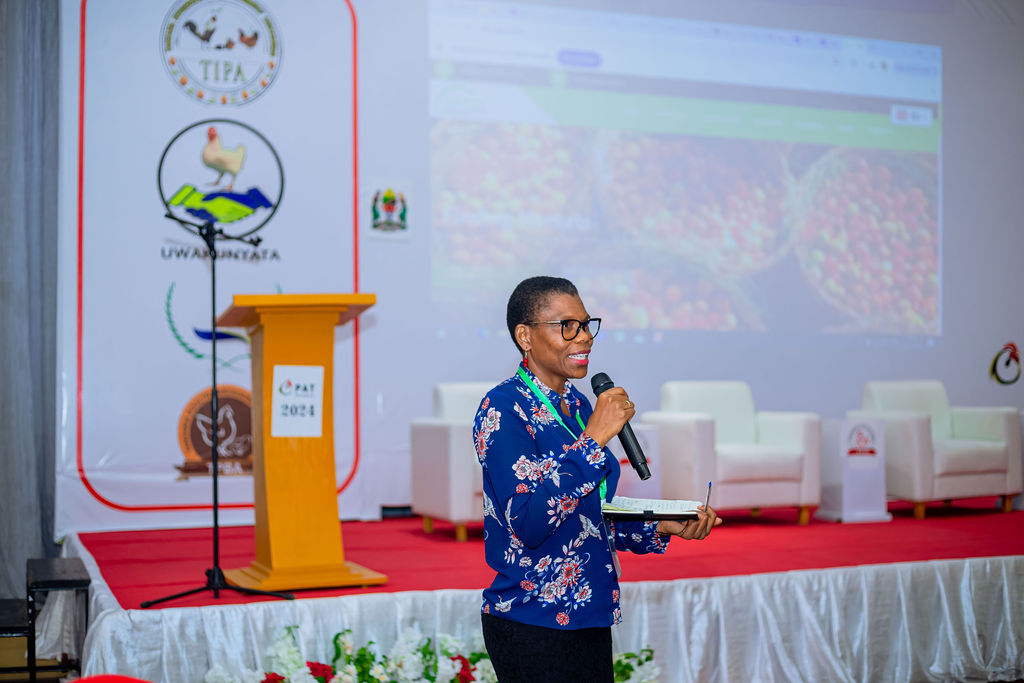Dar es Salaam, October 19, 2024— Tulalumba (Tullah) Mloge, Principal Executive Assistant to the CEO of the SAGCOT Centre (Southern Agricultural Growth Corridor of Tanzania ) and a seasoned agricultural economist, delivered a compelling speech at the Tanzania Poultry Show 2024. The event, held at Mlimani City from October 18-19, brought together key stakeholders from the agriculture and livestock industries to discuss emerging opportunities and challenges.
Mloge underscored the urgent need for increased investment in soybean cultivation, highlighting its pivotal role in strengthening Tanzania’s agricultural sector. She explained that soybeans are essential for the poultry industry as a key ingredient in high-quality animal feed. By boosting local production, Tanzania could significantly reduce its reliance on costly imports, lower feed costs, and enhance profitability for poultry farmers.
In a major announcement, Mloge revealed that a National Strategy for Soybeans is under development alongside the National Poultry Strategy. These initiatives are designed to address both immediate and long-term opportunities within the soybean and poultry sectors.
“The National Strategy for Soybeans is in the offing, as is the National Poultry Strategy. These long-term strategic plans, when finalized, will be implemented to ensure stakeholders can tackle the opportunities and challenges head-on,” Mloge said.
She emphasized that these strategies aim to build a robust framework to support sustainable growth in both industries, aligning with Tanzania’s broader agricultural transformation agenda. The focus is on strengthening the entire value chain—from production to market—to ensure that both sectors contribute significantly to national food security and economic resilience.
Mloge also highlighted the potential for smallholder farmers to play a more significant role in soybean production. While traditionally seen as a large-scale crop, she argued that smallholders could become key players with the right tools and market access. She pointed to Zambia’s success, where smallholder farmers have contributed to price increases, demonstrating the crop’s economic value and the importance of small-scale participation.
“Soybean is a large-scale crop, but we must also find ways to involve our smallholder farmers. They too can benefit from this lucrative sector with proper support and tools,” she urged.
Mloge praised SAGCOT’s collaborative efforts with partners like the International Institute of Tropical Agriculture (IITA) and the World Food Programme (WFP) to provide technical training and market support to farmers. These partnerships are critical in reducing risks for smallholders and ensuring sustainable agricultural development. She underscored the importance of blending scientific knowledge with practical support to unlock the sector’s full potential.
Elaborating further, Mloge pointed to the growing demand for soybeans domestically and regionally. She noted that rising soybean prices in neighboring countries, such as Zambia, reflect the crop’s increasing profitability, especially for smallholder farmers.
“Soybean prices have risen steadily across the region, driven by factors like increasing demand for animal feed and soybean-based products,” she explained. “In Zambia, smallholder farmers have seen significant income increases due to higher soybean prices. This shows the potential for Tanzanian farmers to benefit similarly with the right market access and production support.”
Mloge acknowledged the challenges faced by smallholders, particularly the lack of access to tools and resources needed to cultivate soybeans on a larger scale. She called for an enabling environment, with a focus on providing affordable inputs, training, and financial support. SAGCOT’s role in connecting farmers with private sector partners and government initiatives is crucial in making these resources available.
“If we empower smallholder farmers with the tools, training, and market access they need, they can meet the growing demand for soybeans within and beyond our borders. This will not only strengthen our agricultural sector but also provide much-needed income for rural communities,” Mloge concluded.
The Tanzania Poultry Show 2024 served as an important platform for advancing discussions on the future of Tanzania’s agricultural sector. Mloge’s emphasis on soybean cultivation underscored the crop’s potential to drive economic growth, enhance food security, and uplift the livelihoods of smallholder farmers across the country.
SAGCOT and its partners have published a landmark report titled the Tanzania Sustainable Soybean Initiative (TSSI) Baseline Report, which provides crucial insights into the current state of soybean production in Tanzania. The report highlights the challenges smallholder farmers face, including limited access to quality inputs and training and market constraints. It emphasizes the importance of improving agronomic practices, strengthening market linkages, and scaling up investment in the sector to boost productivity and sustainability. Additionally, the report identifies opportunities to integrate smallholder farmers into the value chain better, ensuring broad-based economic benefits for the agricultural sector.
The report can be downloaded in SAGCOT website- https://sagcot.co.tz/wp-content/uploads/2024/10/SOYA-BEANS-REPORT-APPROVED-2.pdf
